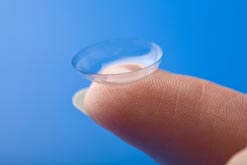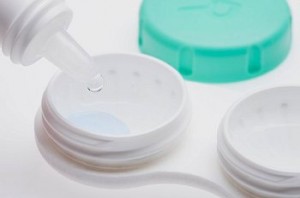Contact lenses bring normal and sharpened vision to its users. Improper care for this small disc of thin plastic can increase risk for eye infections. Take not of these 10 risks that you could be exposing your eye to and avoid infection.
When you handle your lenses: Be sure to thoroughly wash your hands before touching your contact lenses or your eyes, and trim your fingernails short so you don’t tear or scratch your lenses. Never use tap water or saliva to wash your lenses – stick to the contact lens solution appropriate to your lens type. If you don’t know which solution is right for you, ask your eye care professional.
When you wear your lenses too long: Many eye doctors advise against the use of extended-wear contacts, and they have a good reason. Contact lenses block oxygen to your eyes. If you wear them overnight or for longer than prescribed by your eye care professional, you boost your risk of corneal ulcers that can scar your cornea or even cause blindness. Long wear also causes eye irritation.
When you take medications: Did you know that certain types of medications can have an impact on your contacts? For example,taking the birth control pill boosts estrogen and can make a woman’s eyes more sensitive to her contacts. Tell your eye care professional about any medications you take on a regular basis.
When your solution becomes the problem: Contact lens solutions come in many varieties: some rinse, some clean, some disinfect, some rewet the eyes or boost tear production, and some multipurpose formulas do it all. Each of these types of products contains preservatives that can expire or become irritating to the eyes. Don’t use the solution if it’s past its expiration date. In addition, never transfer solution into a smaller container for travel or to carry in your purse – this increases the risk for contamination and transfer of germs.
When your eyes get too dry: Since contacts cover the surface of the eye and restrict oxygen, many wearers experience dry eyes now and then. Carry a bottle of artificial tears or rewetting drops, and be sure to blink often to keep eyes lubricated. Do not put saliva on contacts to relubricate them.
When you put on makeup: Your makeup bag and vanity table is filled with possible eye irritants. Never share eye makeup or apply shadows, mascara, or eyeliner to swollen, red, or infected eyes. And timing matters, too – if you wear soft contacts, insert your lenses before you apply makeup.
When you visit the hairdresser: Salons swarm with airborne chemicals from hairsprays and other products. Either don’t wear your contacts to your next appointment or shield your eyes.
When you go outside: Tiny airborne irritants like dust, pollen, mold, smoke, and pet dander can make their way into your eyes and stick to your contacts can irritate your eyes. Excessive tearing in reaction to allergens can make it uncomfortable to wear your contacts. Consider switching to your glasses on high pollen days or when you know you’ll encounter irritants.
When you take a dip: Wearing your contacts into a chlorinated pool or natural body of water puts your lenses at risk of contamination. If you can manage it, swim lens-free and wait about an hour before you put your contacts back in.
When you light up a cigarette: Smokers who wear contacts are at 8 times the risk of developing corneal ulcers than non-smoking lens wearers.
At the first sign of an eye infection, remove your lenses immediately and consult your eye doctor. More information regarding contact lenses care and tips to reduce infection can be viewed at the FDA US Food and Drug Administration’s webpage.


